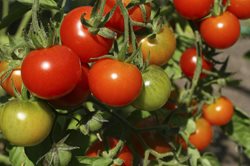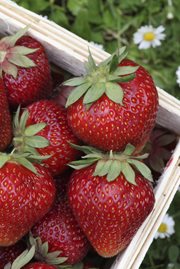Whether you’re new to growing your own fruit and veg and are making a start on being more self-sufficient, or looking for a way to improve your current fruit and veg growing practices, companion planting could be a great way to go.
A technique that involves creating a community of mutually beneficial plants, companion planting can improve pollination and provide an organic method of pest reduction. Also known as a polyculture, planting different species side-by-side can offer a range of other benefits, including improving soil structure, boosting nutrients and reducing disease.
However, selecting the wrong pairings can inhibit growth, so if you’re considering companion planting, it’s vital to make sure you group the right plants together. To help you, we’ve put together this companion planting guide for three of the UK’s most popular plants: tomatoes, strawberries and carrots.
 Tomato Companion Plants
Tomato Companion Plants
Generally considered as an easy-to-grow plant, beginners often opt for tomatoes as one of their first home-grown foods. However, just like any other produce, in the wrong conditions tomato plants can perish. To prevent this, consider growing tomato-friendly plants nearby.
Tomato Friendly Plants
- Carrots: their roots penetrate deeper into the soil, helping to bring more nutrients and water to the surface, benefitting tomato growth.
- Basil: the scent of basil is known to repel a range of pests, attract bees to improve pollination and enhance the flavour of nearby tomatoes.
- Garlic: the smell of garlic deters spider mites which would otherwise damage tomatoes.
Additionally, parsley, lettuce and onion may also work as tomato companion plants.
Plants Benefitted by Tomatoes
- Asparagus: tomatoes produce a chemical that repels the asparagus beetle.
- Gooseberries: the scent produced by tomatoes deters pests that prey on gooseberries.
Plants to Avoid
- Fennel: this can limit the growth of tomatoes.
- Potatoes: planting potatoes nearby may increase the risk of tomato blight.
- Cabbage family: this includes plants like broccoli, cauliflower and cabbage, which are known to inhibit tomato growth.
 Strawberry Companion Plants
Strawberry Companion Plants
A delicious fruit and a favourite home-grown option, with the right neighbours, strawberries can flourish in any garden. To assist yours, here are the strawberry companion plants that can help, as well as the ones that can hinder.
Strawberry Friendly Plants
- Onions and garlic: the scents produced help to repel common strawberry pests.
- Beans: legumes boost soil nutrition, helping strawberries to flourish.
- Thyme: planting thyme next to a strawberry patch can be an effective worm deterrent – one of the biggest strawberry pests.
Plants Benefitted by Strawberries
- Lettuce and spinach: mutually beneficial, planting lettuce and spinach in close proximity to strawberries can help all three flourish.
Plants to Avoid
- Cabbage family: including kale, cabbage and broccoli, the cabbage family can inhibit the growth of strawberries.
 Carrot Companion Plants
Carrot Companion Plants
Carrots are another popular option and can be a great choice for companion planting in the UK. This is because they work well with a variety of plants, although there are a few you should avoid.
Carrot Friendly Plants
- Tomatoes: they provide lots of shade to help carrots stay cool while also producing a chemical called solanine that repels carrot flies.
- Onions and leeks: their scent works as a deterrent to carrot flies and pests.
- Chives: their fragrance can help to enhance the flavour of your carrots.
In addition, sage, rosemary and lettuce are popular carrot companion plants.
Plants to Avoid
- Parsnips and celery: while these belong to the same family as carrots, they are vulnerable to the same pests, so it’s best to avoid planting them together.
- Coriander and dill: damaging chemicals released by these herbs can stunt growth.
Additional Companion Planting Tips
Take a look at our yearly sowing, planting and harvesting planner, invest in a polytunnel for year-long growth, and consider these additional companion planting tips:
- Plant herbs across your vegetable patch (being careful to avoid harmful pairings like carrot and coriander), as their scent can deter insects.
- Add insect and bird friendly varieties to your garden to enhance pollination and attract friendly predators.
- Avoid grouping the same plant together (known as a monoculture), as this can expose your fruits and vegetables to disease and pests.